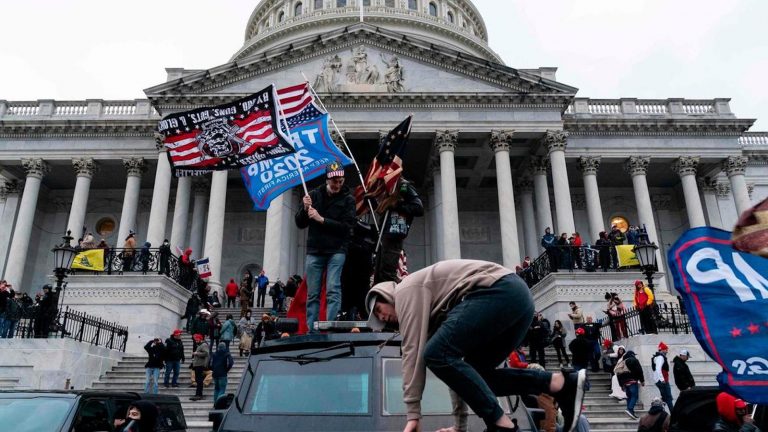There was a time not so long ago that violence as a political tactic was primarily espoused and practiced by left authoritarians in the U.S., particularly Antifa. That changed on Wednesday when the U.S. Capitol was briefly overtaken by protestors. So far, a reported five people have died that day. Horrible, but it could have been far, far worse.
Radical elements of the MAGA coalition have apparently embraced the tactics of the violent left, saying in effect, “hold my beer.” What a dumb, and utterly ineffective gesture, one that will have a lasting and negative impact on many of the values and issues that you and I hold dear. As I said on Twitter at the time: “Violence is morally wrong and strategically counterproductive. It empowers your enemies and diminishes our liberties. This is true regardless of who is doing it, left or right.” Expect to see all sorts of new legislation infringing on the liberties of peaceful, law abiding Americans in the name of fighting “domestic terrorism.”
Regardless of your political team—and, as a Libertarian I don’t really have a “team” in this tribal war—it is important that we hold everyone to the same standard. It’s not enough to say: “but Antifa did far worse…” It is also unacceptable to say, as some on the left have done in the past few days, that some violence is righteous, and some not. Violence, warned Dr. Martin Luther King Jr., begets more violence.
In hindsight, something like this was bound to happen. In March of 2016 in an article entitled: “Trump protesters want violence; Don’t give it to them” I warned against a disturbing trend:
And:
When I was a grassroots organizer, we carefully studied the tactics of successful nonviolent social movements. We spent a great deal of time training activists on the tactics and history of the civil rights movement in particular. On this question, Dr. King was unequivocal: “The ultimate weakness of violence,” he said, “is that it is a descending spiral begetting the very thing it seeks to destroy, instead of diminishing evil, it multiplies it.” Nonviolence is a moral principle (don’t hurt people and don’t take their stuff). It is also the right tactical strategy if our goal is to engage the “liberty curious” among us seeking an alternative to government coercion.
What now? Here’s a few (admittedly half-baked) thoughts on the path forward.
- Partisan politics is not the answer. Politics has somehow become a silver bullet solution for some. “Elect our guy and he will fix everything,” they say. But that’s not us. Team sports, instead of core principles, allows us to be used and manipulated by partisan hacks who don’t care about us or our values. They only care about power, and will say anything to get it. Convincing activists that Congress had the Constitutional power to overturn the presidential election is an egregious, and now deadly, example of this, but it happens all the time. Empty promises manipulate us into fighting for our “team,” against those other barbarians at the gate. The alternative is what Thomas Massie calls “trans-partisan.” It’s a joke with an essential point: He doesn’t “identify” with either party, instead choosing to focus on ideas that, from his perspective, advance human liberty. A practical example of this is his willingness to work with any member of Congress, regardless of party, where there is common ground based upon shared principles. A real-life example of this is my recent conversation with Massie and Congresswoman Tulsi Gabbard, which you can watch here.
- Focus on countering the authoritarian values that have dominated popular culture. That’s where hearts and minds change, and that’s where America’s narrative is written. We believe in the unstoppable power of free people solving problems. We have to tell that story, again and again, in emotionally compelling ways. And it’s a positive and beautiful story about taking control and responsibility for your own life. That means challenging government schools for sure. But more important is to reach outside of tribal click-bait bubbles (yes, Libertarians have them just like everyone else) into film, music, art, alternative media, social gatherings, formally and informally helping out our neighbors, and other forms of community building. These are just some of the many mediums and practices that offer alternative ways for young people to learn. Go upstream of politics, because that’s where change happens. Go local, because bottom-up is so much more powerful than top-down. This is where we effectively counter the alarming emergence of intolerant authoritarianism, left, right or whatever you want to call it.
- End the culture war. This is the only way to get out of the death spiral that led to yesterday’s violence. Stop the relentless quest to seize unlimited federal power so that your tribe can take control and force the rest of America to live by your personal preferences. On this question, I defer to your mom, who taught you to live and let live, as long as no one hurts people or takes their stuff. From my perspective, the only real roadmap to peace among America’s warring partisan tribes is “small-l” libertarian. That means that you and your family decide, instead of the current party in power. It also means finding innovative ways to “hack” central control, like the many parents currently abandoning government schools and the teachers unions who put their own needs in front of the needs of your children. It means community-based solutions that help neighbors without looking to Washington. It means fixing local, broken criminal justice systems, with community-based alternatives like restorative justice. Community, justice, localism, parental control, freedom of worship, freedom of choice—these are all core principles that will find much common support at the local level.
- The counter-revolution is mutual respect. Only free people have the capacity to learn to respect others. It is polar opposite of the politics of angry, leveraged minorities (or as Madison would say, Factions). This next social movement is more difficult to build because it is not particularly clicky—it’s equal parts empathy and righteous anger. We should be angry at all of the injustices at the hands of a mindless political establishment that profits by keeping us divided. That balance—between love and indignation—is the part we have to defend. It is always peaceful and voluntary, and it is the core value of our community of common purpose.
I’m just scratching the surface, but this, I believe, is where we can channel the untapped power of free people. And I’m optimistic that we will, because we have to. As the great moral philosopher Jerry Garcia once observed: “One way or another, this darkness got to give.”














For four years conservatives have been called deplorables, racists, Nazi’s and worse. Not by someone sitting in momma’s basement, but by the MSM, prominent Democrats and most of Hollywood. We’ve been harassed, banned from restraunts and assaulted in public. It was just a matter of time before something like this happened.
Matt,
Great half-baked article. Some things are best al dente 😉
Let me know if I may mail you a copy of my recent book “Think Right or Wrong, Not Left or Right: A 21st Century Citizen Guide” which also addresses the path forward, albeit in more general terms.
https://www.amazon.com/Think-Right-Wrong-Not-Left/dp/B08RH34WV8/ref=sr_1_1?crid=3352TB6FYGD4H&dchild=1&keywords=think+right+or+wrong&qid=1610417582&sprefix=think+right+or%2Caps%2C694&sr=8-1
Keep up the good work!
Anders Ingemarson